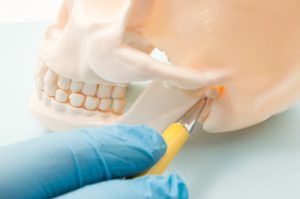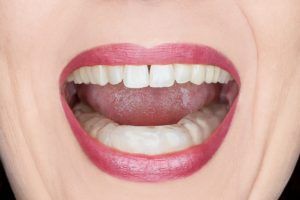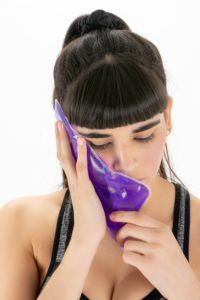Your temporomandibular joint (TMJ) is one of the most powerful and frequently used joints in your entire body. Located on either side of your head around your ears, the temporomandibular joint is responsible for opening and closing your jaw, as well as moving it forward, backward, and sideways. These motions allow you to eat and speak. When problems begin to occur with your TMJ, daily activities like eating and speaking can be affected.
Problems with the temporomandibular joint occur when one of its various structures is not functioning properly. The temporomandibular joint is made up of a ball and socket joint, various ligaments providing stability to the joint, and supporting jaw muscles that are responsible for moving the joint. When one or more of these structures is overworked, it can cause pain and inflammation in the entire joint. TMJ treatment at Tulsa Precision Dental works on reducing stress applied to the TMJ to reduce or eliminate symptoms.

Did You Know?
There are 360 joints in the human body and 86 joints in the skull alone. Out of all these 360 joints, the temporomandibular joint is used the most.
Frequently Asked Questions:
When should I seek TMJ treatment?
You should seek TMJ treatment when you begin to experience symptoms of TMJ disorder. Generally symptoms will begin between the ages of 30-50. Possible symptoms of TMJ disorder include: headaches, temple pain, jaw pain, stiffness in the neck, shoulder or upper back pain, restricted jaw movement, earaches or ringing in the ears, dizziness, and clicking, popping, or grinding in the jaw joint while speaking or eating. Symptoms of TMJ disorder may get worse without treatment, so it is important to schedule a consultation with Tulsa, OK dentists Drs. Chris and Kristie Vinson as soon as you begin to notice symptoms.
Additionally, you may want to seek TMJ disorder treatment if you have arthritis, a previous jaw injury, your bite or teeth are misaligned, or if you know you grind or clench your teeth. All these things can cause a TMJ disorder to develop, so preventative treatment may be used. Other risk factors for a TMJ disorder can include genetics, gender, and age. If you have an immediate family member with TMJ, are a woman, or are between the ages of 30-50, then you are at a higher risk for developing a TMJ disorder.
What can I expect when undergoing TMJ disorder treatment?
When starting TMJ disorder treatment, Drs. Chris and Kristie Vinson will ask you about your symptoms and perform an oral exam. They may gently apply pressure to certain areas of your face to test for sensitivity. They will also evaluate the alignment of your bite. They may also examine your teeth for signs of wear that could indicate uneven pressure.

Once they have evaluated your teeth and bite, they will develop a personal dental care plan to manage your TMJ symptoms. This will generally consist of wearing a night guard to reduce the pressure placed on your jaw joint. Depending on your individual case, you may receive a night guard that either stabilizes or repositions your jaw. Stabilizing night guards simply provide a barrier between your upper and lower teeth that prevents you from grinding or clenching in your sleep. Repositioning night guards, on the other hand, will actually hold your jaw in a slightly different position to alleviate pressure on certain structures. Sometimes repositioning night guards can even restrict the movement of your lower jaw when worn.
To make you a customized night guard, Drs. Chris and Kristie Vinson will take a dental impression of your mouth and send this to a dental lab. During a dental impression, you will close your mouth and bite down on a soft putty contained in a metal or plastic tray. Over the course of about a minute, this putty will gradually harden to a rubber-like consistency. The resulting impression will be used by the dental lab to custom fit your night guard.
After your night guard has been fabricated, Drs. Chris and Kristie Vinson will ensure that it fits and provide you with instructions for its use and care. During the beginning of your treatment, you will need to return to Tulsa Precision Dental occasionally so Drs. Chris and Kristie Vinson can monitor your progress and make adjustments to your night guard as needed. Once your symptoms begin to improve, these visits will be spaced further out.
Does TMJ treatment work?
TMJ treatment is just like any other type of treatment and can have mixed results. However, the vast majority of individuals who undergo TMJ treatment with a night guard report reduced or eliminated TMJ disorder symptoms. This is because most cases of TMJ disorders are caused by overworked jaw muscles due to teeth grinding or clenching. Most teeth grinding and clenching occurs at night, when your body is supposed to be relaxing. This means that your jaw muscles end up working around the clock without any rest. This constant tension is the main source of TMJ pain. Night guards act as a barrier between the upper and lower teeth, preventing them from grinding or clenching. Wearing a night guard forces your muscles to relax, which will alleviate your symptoms.
In addition, TMJ treatment can eliminate symptoms that you may have not realized were related. Some common examples are tinnitus (ear ringing), GERD, and sleep apnea. Although the connection is not exactly clear, studies have found that TMJ disorders affect those conditions and treating TMJ disorders can help treat these disorders as well. Finally, treating your TMJ disorder is good for your overall oral health as well because it prevents unnecessary wear on your teeth.
How else can I treat my TMJ disorder?

In addition to wearing your night guard, there are a few other things you can do to manage your TMJ symptoms. One main aspect of TMJ treatment is to identify and reduce sources of stress in your life. People who grind their teeth are generally under more stress. Practicing daily relaxation techniques such as yoga, meditation, focused breathing, and guided image therapy can help reduce the tension responsible for temporomandibular disorder. Depending on your individual case, physical therapy may also be recommended to stretch and strengthen your facial muscles. Finally, when you are experiencing episodes of jaw pain, it is recommended to eat soft foods and rest your jaw as much as possible to reduce symptoms.
At Tulsa Precision Dental, your smile is our top priority. For a full range of dental services using the latest in dental technology, schedule a consultation with Tulsa, OK dentists Drs. Chris and Kristie Vinson today!



